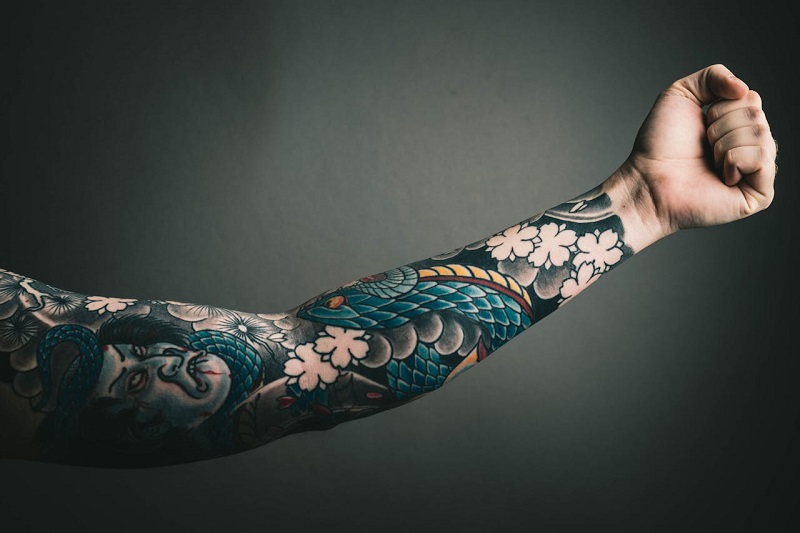Have you ever glanced at someone’s tattoo and wondered about its meaning?
Tattoos are more than just artistic expressions; they are visual memoirs that speak volumes about the wearer’s life experiences.
In this blog post, we’ll delve into the fascinating world of tattoos as storytelling devices, uncovering the layers of significance behind popular designs and symbols.
By understanding these narratives, you may discover a deeper appreciation for the stories woven into our society’s fabric.
1. Tattoos as Personal Narratives

Each tattoo represents a life chapter
Every tattoo is a reflection of a personal journey.
Whether it marks a significant milestone, a personal transformation, or a cherished memory, tattoos serve as chapters in the story of an individual’s life.
Each element—symbol, color, or design—adds depth and meaning.
Milestones and memories in ink
- Commemorating achievements or major life events.
- Honoring relationships or family connections.
- Symbolizing personal growth and challenges overcome.
2. Cultural and Historical Storytelling Through Tattoos
Tattoos as a cultural legacy
Many tattoo styles carry historical or cultural significance. From Polynesian tribal tattoos to Japanese irezumi, tattoos have long been used to preserve cultural stories, spiritual beliefs, and ancestral heritage.
These tattoos communicate deep meanings that resonate across generations.
Examples of traditional storytelling tattoos
- Polynesian tattoos representing family, rank, and protection.
- Japanese tattoos depicting folklore and mythological tales.
- Native American tattoos as symbols of identity and tribal history.
3. Symbolism and Hidden Meanings

Communicating through subtle signs
Colors, shapes, and placement often convey messages visible only to those who understand their significance.
Hidden meanings in tattoos allow individuals to carry personal secrets, beliefs, or reminders that remain private while sharing their story silently.
Private and symbolic storytelling
- Symbols with personal or spiritual significance.
- Colors representing emotions or phases of life.
- Placement choices that enhance privacy and personal meaning.
4. Emotional Expression Without Words
Capturing emotions in art
Tattoos are a visual expression of emotions that may be difficult to articulate.
Love, loss, courage, and resilience can all be represented in ink, offering a permanent reminder of emotional experiences. For many, tattoos act as therapeutic tools or memorials for significant life events.
Emotions conveyed silently
- Tribute tattoos for loved ones.
- Symbols of personal growth or resilience.
- Emotional reminders for motivation and reflection.
5. Visual Storytelling and Artistic Style

Style enhances the narrative
The choice of tattoo style—realism, abstract, minimalism, or illustrative—adds layers to the story.
Placement, color, and design work together to create a visual narrative that communicates meaning even without words, making each tattoo a unique storytelling medium.
Combining design, placement, and style
- Realistic tattoos bring personal memories to life.
- Abstract designs evoke emotion and interpretation.
- Minimalist tattoos provide subtle, meaningful messages.
Conclusion
Tattoos are a powerful form of silent storytelling, allowing individuals to share personal narratives, cultural heritage, symbolism, and emotions without a single word.
They serve as visual chronicles of life experiences, marking milestones, honoring loved ones, and reflecting personal growth.
Cultural and traditional tattoo styles preserve historical stories and spiritual beliefs, connecting individuals to their ancestry and community.
The use of symbolism, color, and placement allows tattoos to convey hidden meanings, private messages, or personal secrets known only to the wearer.
Emotionally, tattoos capture feelings like love, loss, courage, and resilience, providing permanent reminders that can inspire or heal.
The artistic style of a tattoo enhances its narrative power, from realistic portraits that immortalize memories to abstract designs that evoke thought and introspection.
Together, design, placement, and symbolism create a visually compelling story unique to each individual.
Unlike other art forms that are observed externally, tattoos live on the body and interact with daily life, creating an intimate, ongoing narrative.
Understanding the storytelling power of tattoos encourages mindful choices, ensuring each piece reflects a meaningful chapter of the wearer’s life and communicates a story that resonates both silently and powerfully.
Frequently Asked Questions
- Q1: How do tattoos tell stories without words?
- A1: Tattoos use imagery, symbols, placement, and style to communicate personal experiences, emotions, and cultural narratives silently.
- Q2: Can tattoos convey personal milestones?
- A2: Yes, many tattoos commemorate achievements, life changes, or important relationships, marking significant chapters in the wearer’s life.
- Q3: What role does symbolism play in tattoo storytelling?
- A3: Symbols, colors, and placement often convey hidden meanings, allowing tattoos to carry private messages and deep personal significance.
- Q4: How does artistic style enhance a tattoo’s story?
- A4: Different styles, such as realism, abstract, or minimalism, help convey emotion, context, and narrative depth, making the tattoo’s story visually compelling.
- Q5: Are cultural tattoos considered storytelling?
- A5: Absolutely, cultural and traditional tattoos preserve history, heritage, and spiritual beliefs, acting as a visual narrative passed through generations.
Other Blog Posts
- 5 Reasons Tattoos Are More Personal Than Any Other Art Form
- Why Tattoo Placement Matters Just as Much as Design
- 5 Reasons Short Haircuts Will Never Go Out of Style
